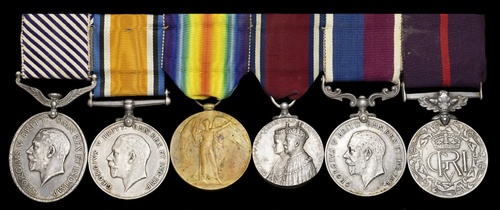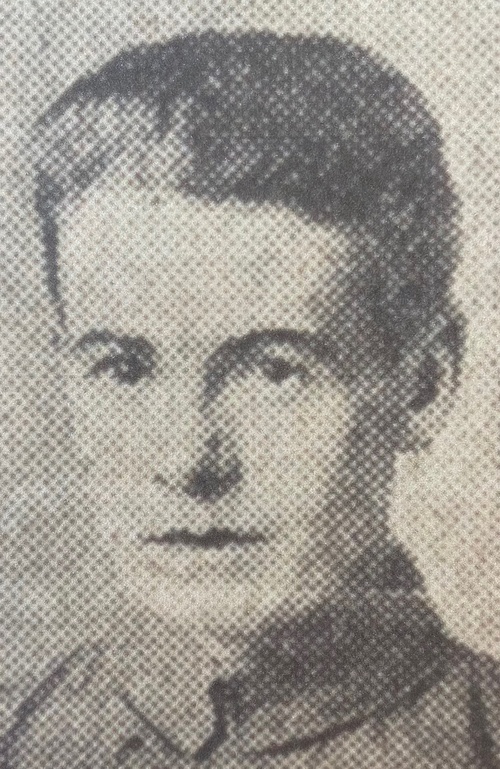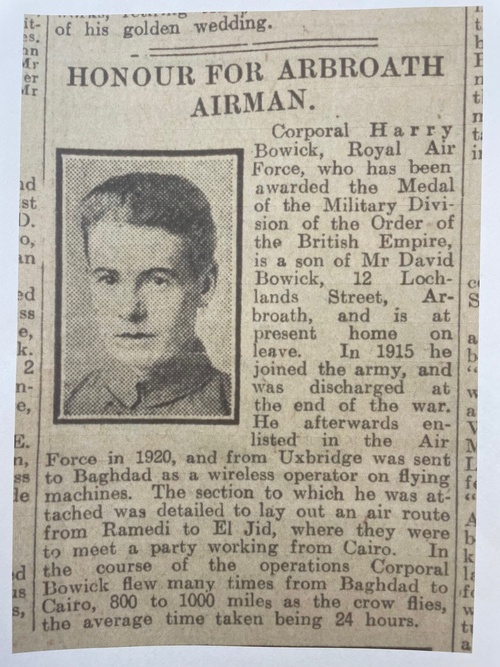Auction: 25001 - Orders, Decorations and Medals
Lot: 393
The unique Iraq 1922 D.F.M. and 1923 B.E.M. group of six awarded to Flight Sergeant H. Bowick, Royal Air Force, late Machine Gun Corps, for his services as an Aerial Gunner, the latter award with a 'flying' citation for the opening of the Amman-Ramadieh Aerial Route
Distinguished Flying Medal, G.V.R., (341282 Cpl. H. Bowick, R.A.F.); British War and Victory Medals (56608 Pte. H. Bowick, M.G.C.); Jubilee 1935; Royal Air Force L.S. & G.C., G.V.R., coinage head issue (341282 F. Sgt. H. Bowick, R.A.F.); British Empire Medal, Military Division, G.V.R. (No. 341282 Corpl. Harry Bowick, R.A.F.), mounted as worn in this order, as perfectly correct for the period, this last with obverse rather polished, very fine (6)
14 D.F.M.'s awarded for operations in Iraq 1922-29, five of these for 1922.
D.F.M. London Gazette 6 June 1924:
'...for distinguished service rendered during operations in Iraq 1922.'
B.E.M. London Gazette 1 January 1923. The original recommendation states:
'In recognition of distinguished and meritorious services rendered in connection with the opening of the AMMAN-RAMADIEH Aerial Route.
For meritorious service and devotion to duty. He spent over 100 hours in the air on desert reconnaissance and has performed good service in maintaining wireless communication during flights over difficult country.'
Harry Bruce Bowick was born in 1898 at Montrose, Forfarshire. He is understood to have originally served in the Scottish Horse (1/3rd) and later went to Salonika with No. 77 Company, Machine Gun Corps. Remaining there until the Armistice, they become part of the occupying forces in Bulgaria, then left for Egypt in April 1919 when it was disbanded in July 1919. Bowick then obtained a transfer to the Royal Air Force in Egypt as an Aerial Gunner.
An uprising in Iraq in May 1920 united Sunni and Shia briefly against the British. It was put down, but required the deployment of more than 100,000 British and Indian troops. Thousands of Arabs were killed. Hundreds of British and Indian soldiers died. The military campaign cost Britain tens of millions of pounds - money it could not afford after the Great War.
A new way of controlling Iraq was needed. Churchill had to square huge military budget cuts with British determination to maintain a grip on its mandate in Iraq. The result became known as "aerial policing". It was a policy Churchill had first mused on in the House of Commons in March 1920, before the Iraqi uprising had even begun:
'It may be possible to effect economies during the course of the present year by holding Mesopotamia through the agency of the Air Force rather than by a military force. It has been pointed out that by your Air Force you have not to hold long lines of communications because the distance would only be one or one-and-a-half hours' flight by aeroplane. It is essential in dealing with Mesopotamia to get the military expenditure down as soon as the present critical state of affairs passes away.'
The defeat of the Iraqi uprising was credited in part to the deployment of Royal Air Force bombers. The embryonic force - attempting to carve out a permanent role for itself and avoid being consumed by the other armed services - took on command of all future military operations in Iraq. When troubles flared again, villages held by rebellious tribes were attacked from the air.
Royal Air Force armoured cars and bomber planes on duty in Iraq during the Mesopotamia conflict, the Air Minister, Lord Thomson, detailed how one district of "recalcitrant chiefs" was subdued in the Liwa region on the Euphrates in November 1923. He wrote:
'As they refused to come in, bombing was then authorised and took place over a period of two days. The surrender of many of the headmen of the offending tribes followed.'
As far as the British government was concerned, the strategy was a pragmatic success. Iraq was subdued by a handful of Squadrons and a small force of troops. They maintained military control over Iraq until World War Two, even after Iraqi independence in 1932. Bowick died on 23 January 1957 and is buried at Sleaford, Lincolnshire.
Sold together with copied research including M.I.C. (confirms Pair only), Flight lists, confirmation of L.S. & G.C. Medal in February 1935, newspaper cutting and other research.
Subject to 20% VAT on Buyer’s Premium. For more information please view Terms and Conditions for Buyers.
Estimate
£6,000 to £8,000
Starting price
£5800









